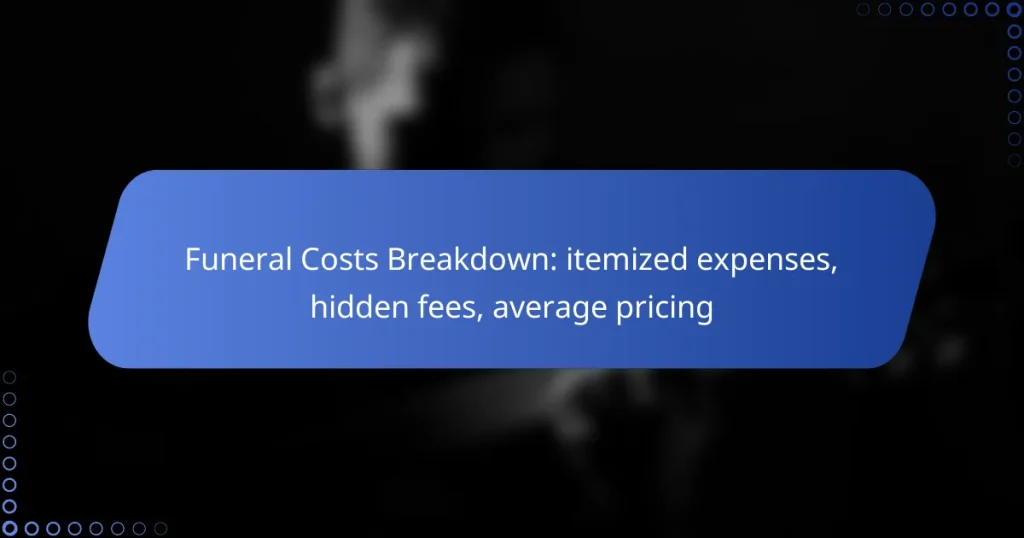Understanding the breakdown of funeral costs is essential for families navigating this difficult time. In Canada, average funeral expenses can range from CAD 5,000 to CAD 15,000, influenced by service type and burial or cremation choices. Being aware of itemized expenses and potential hidden fees can help families budget effectively and avoid unexpected financial burdens.

What are the average funeral costs in Canada?
The average funeral costs in Canada typically range from CAD 5,000 to CAD 15,000, depending on the type of service and burial or cremation choices. Families should be aware of various itemized expenses and potential hidden fees that can significantly impact the overall cost.
Average burial costs
Average burial costs in Canada generally fall between CAD 8,000 and CAD 12,000. This includes expenses such as the casket, burial plot, headstone, and service fees. Additional costs may arise from embalming, transportation, and other services, which can add several hundred to thousands of dollars to the total.
When planning for a burial, consider the type of casket and the location of the burial site, as these factors can greatly influence the final price. It’s advisable to compare prices from different funeral homes to ensure you are getting a fair deal.
Average cremation costs
The average cost of cremation in Canada typically ranges from CAD 3,000 to CAD 7,000. This cost usually covers the cremation process, a basic urn, and necessary paperwork. However, additional services such as memorial services or upgraded urns can increase the total expense.
Families opting for cremation should inquire about direct cremation options, which can be more affordable. Always ask for a detailed breakdown of costs to avoid unexpected fees.
Regional cost variations
Funeral costs can vary significantly across different regions in Canada. Urban areas like Toronto and Vancouver tend to have higher prices due to increased demand and higher living costs, while rural areas may offer more affordable options.
It’s essential to research local funeral homes and their pricing structures. Some provinces may have regulations that affect pricing, so understanding local laws can help in making informed decisions.

What are the itemized expenses for a funeral?
Funeral expenses can vary significantly based on choices made by the family, but they typically include several key itemized costs. Understanding these expenses helps families budget effectively and avoid unexpected fees during a difficult time.
Casket costs
Casket costs represent one of the largest expenses in a funeral budget. Prices can range from a few hundred to several thousand dollars, depending on the materials and design. Common options include metal, wood, and biodegradable caskets.
When selecting a casket, consider the features that matter most to you, such as durability, aesthetics, and environmental impact. Many funeral homes offer a variety of caskets, so it’s wise to compare prices and options before making a decision.
Service fees
Service fees cover the funeral home’s basic services, which may include planning, paperwork, and coordination of the funeral. These fees can vary widely, typically ranging from a few hundred to several thousand dollars.
It’s essential to ask for a detailed breakdown of service fees when discussing arrangements. Some funeral homes may charge additional fees for specific services, such as embalming or viewing, so clarify these costs upfront to avoid surprises.
Transportation expenses
Transportation expenses encompass the costs associated with moving the deceased and family members. This can include the hearse, limousines, and other vehicles, with prices often ranging from a few hundred to over a thousand dollars.
When planning transportation, consider the distance to the burial site and any additional stops, such as a church or memorial service. Comparing transportation options can help manage costs effectively.
Burial plot costs
Burial plot costs vary based on location and cemetery choice, generally ranging from a few hundred to several thousand dollars. Factors influencing the price include the cemetery’s reputation, plot location, and whether it’s a single or family plot.
Before purchasing a burial plot, research different cemeteries and their policies. Some may have specific regulations regarding plot usage, maintenance fees, or additional costs for opening and closing the grave, so ensure you understand all associated expenses.

What hidden fees should you be aware of?
When planning a funeral, it’s crucial to be aware of hidden fees that can significantly increase overall costs. These fees may not be immediately disclosed and can vary widely depending on the funeral home and services selected.
Administrative fees
Administrative fees cover the costs associated with processing paperwork and managing logistics for the funeral. These fees can range from a few hundred to over a thousand dollars, depending on the complexity of the arrangements and the funeral home’s policies.
To avoid surprises, ask for a detailed breakdown of administrative fees upfront. Some funeral homes may bundle these costs into their service packages, while others list them separately, so clarity is essential.
Embalming costs
Embalming costs typically range from a few hundred to several hundred dollars, depending on the funeral home and the specific services provided. This process is often required if there will be a public viewing or if the body needs to be transported over long distances.
Consider whether embalming is necessary for your situation. If not, you may opt for alternative methods like refrigeration, which can be more cost-effective.
Obituary publication fees
Obituary publication fees can vary significantly based on the publication’s reach and format. Local newspapers may charge anywhere from $100 to several hundred dollars for an obituary, while online platforms may offer lower rates or even free options.
Before submitting an obituary, compare costs across different publications and inquire about any additional fees for photos or extended text. This can help you manage expenses while honoring your loved one’s memory effectively.

How can you reduce funeral costs?
Reducing funeral costs involves making informed choices about services and options available. By considering alternatives like cremation, comparing different funeral homes, and exploring pre-planning, you can significantly lower expenses.
Choosing cremation over burial
Cremation typically costs less than traditional burial, as it eliminates expenses such as caskets, burial plots, and grave markers. The average cost of cremation in the U.S. ranges from a few hundred to a couple of thousand dollars, depending on services selected.
When considering cremation, evaluate what additional services you may want, such as memorial services or urn selection. These can add to the overall cost, but they often remain lower than burial expenses.
Comparing funeral homes
Not all funeral homes charge the same rates, so it’s essential to compare prices and services. Request itemized price lists from multiple funeral homes to understand what each offers and how much they charge for specific services.
Look for homes that provide transparency in their pricing. Many states require funeral homes to disclose their prices upfront, which can help you avoid hidden fees and make a more informed decision.
Pre-planning options
Pre-planning a funeral can help lock in current prices and alleviate the financial burden on your family later. Many funeral homes offer pre-need contracts that allow you to pay for services in advance, often at a fixed rate.
Consider discussing your wishes with family members and selecting a reputable funeral home that offers flexible pre-planning options. This can ensure that your preferences are honored while potentially saving money in the long run.

What financing options are available for funeral expenses?
Several financing options exist for covering funeral expenses, including payment plans offered by funeral homes, personal loans, and credit card financing. Understanding these options can help families manage the financial burden during a difficult time.
Payment plans from funeral homes
Many funeral homes provide payment plans that allow families to spread the cost of services over time. These plans typically require a down payment, followed by monthly installments that can last several months to a few years.
When considering a payment plan, it’s essential to review the terms, including interest rates and any potential fees. Some funeral homes may charge higher prices for services if you choose a payment plan, so it’s wise to compare costs with full payment options.
For example, a funeral service that costs around $7,000 might be offered with a payment plan requiring a $1,500 down payment and monthly payments of $300 for 18 months. Always ask for a written agreement detailing the payment structure and total cost.


